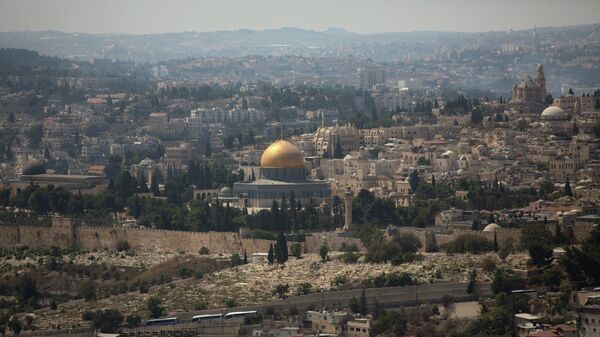Israel's Ambassador to Jordan Amir Weisboard was summoned by the Jordanian government on Sunday to "clarify" the conduct of Israeli security services on the Temple Mount, known to Muslims as the Haram al-Sharif, in Jerusalem, where police clashed with Muslim worshipers last week.
The ministry has voiced its "condemnation and rejection of Israeli violations" at the holy site, where dozens of people were injured during clashes. According to police, the crowds were throwing stones and chairs at Israeli officers.
Amman has earlier denounced remarks made by Israel’s Public Security Minister Gilad Erdan calling for a change to the status quo on the Temple Mount.
In a Tuesday interview with Israel's Radio 90, Erdan voiced support for changing the existing arrangements at the holy site.
"I think there is in an injustice in the status quo that has existed since ’67. We need to work to change it so in the future Jews, with the help of God, can pray at the Temple Mount. This needs to be achieved by diplomatic agreements and not by force", he clarified.
The Jordanian Foreign Ministry quickly reacted the same day, by emphasising that the kingdom "absolutely rejected” Erdan’s remarks, and dismissed "any attempt to prejudice the historical and legal status quo and the serious consequences thereof".
In response, Israeli Foreign Minister Israel Katz jumped to Erdan's defence, saying that despite Jordan's role as the Islamic custodian of the Temple Mount and Jerusalem holy sites, agreed under the 1994 peace treaty between the two countries, Israel was the sovereign over the shrine.
"It is Minister Erdan’s right to put a suggestion on the table for discussion. He didn’t force it but rather set it down. But the sovereignty is the State of Israel’s", Katz told Kan public radio.
Last Sunday, the compound was the site of clashes between Muslim worshipers and Israeli forces during the Islamic holiday of Eid al-Adha, an Islamic holiday commemorating the end of the annual hajj pilgrimage to Mecca, which coincided with the Jewish fast day of Tisha B'Av, which marks the destruction of the First and Second Jewish temples.
Amman was quick to criticise Tel Aviv for using force against worshipers, with Jordanian Foreign Minister Ayman Safadi tweeting:
We condemn Israel’s violations of sanctity of Al Aqsa, especially on this holy day. Its attempts to change the status quo in occupied #Jerusalem & its holy sites will only lead to more violence, threatening security of all. Int’l community cannot remain silent on these violations
— Ayman Safadi (@AymanHsafadi) 11 августа 2019 г.
Initially, Israeli authorities decided not to let non-Muslims enter the Temple Mount, where tens of thousands of Muslim worshipers gathered in the morning on 11 August. However, following mass outrage from right-wing ministers and lawmakers, a group of Jews was allowed in.
Under an arrangement in place since Israel's victory in the 1967 Six Day war, non-Muslims are permitted to visit the Temple Mount but not to pray there. Israel assumed responsibility for security at the holy site, while Jordan became responsible for arrangements and religious and civil affairs there. At the same time, Israel's sovereignty and law extends to the Temple Mount just as to the other parts of Jerusalem as a result of the 1967 war.


